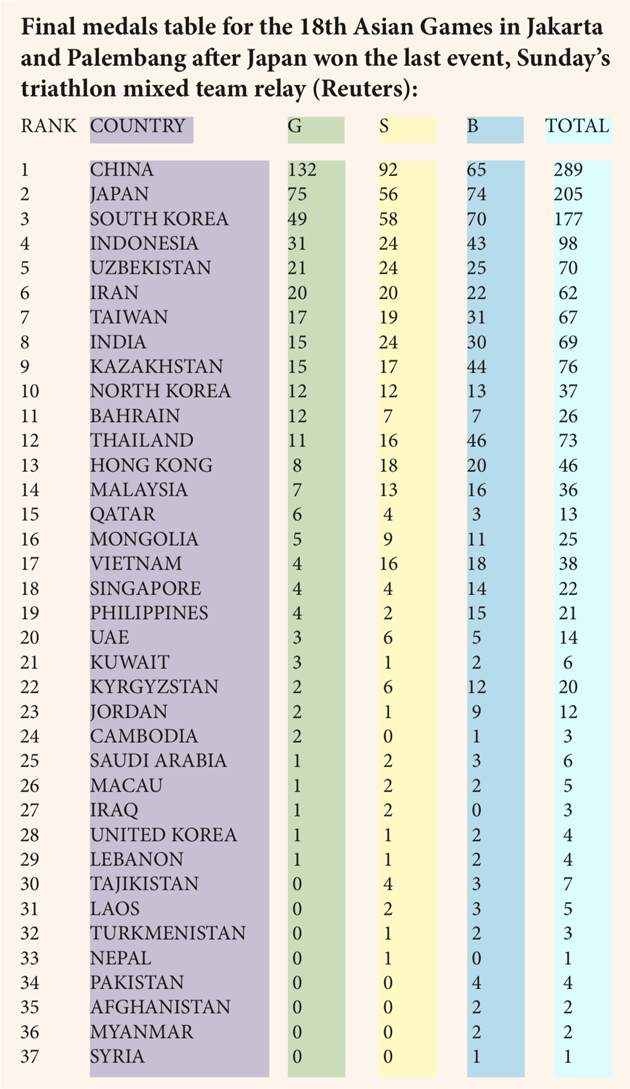JAKARTA, Indonesia: Indonesia billed itself the “Energy of Asia” during the Asian Games, which closed Sunday in a ceremony emphasizing the country’s diversity and the ties linking the 11,000 athletes who competed for 45 nations.
The opening ceremony two weeks ago was highly choreographed, but the athletes starred in most of the closing pomp as they sang and danced on the infield at the Bung Karno stadium during a persistent shower, the first rain in Jakarta for a month.
Sheikh Ahmad Al-Fahad Al-Sabah of Kuwait, the head of the Olympic Council of Asia, got rousing applause when he told the packed stadium: “Thank you Jakarta, thank you Palembang. You did it.”
Indonesia, with 260 million people and the world’s largest Muslim-majority country, agreed four years ago to hold the Asian Games after Vietnam backed out for financial reasons. It chose two host cities, Jakarta and Palembang.
The next Asia Games are in Hangzhou, China, in 2022, and in 2026 in Nagoya, Japan.
Chinese billionaire Jack Ma stepped out on the stage near the end, waving and smiling and plugging his home city.
“I’m Jack Ma,” the chairman of the Alibaba Group said. “It’s a beautiful city. So please come to Hangzhou.”
China, Japan and South Korea topped the medal table — as usual — and host Indonesia had its best Asian Games finishing fourth.
A combined Koreas team stole some of the show, winning four medals over two weeks. Three were in dragon boat racing, and one of those was gold.
A combined Koreas women’s ice hockey team also competed in the Winter Olympics six months ago in Pyeongchang, South Korea, but did not win a medal.

The other games show-stopper was Japanese swimmer Rikako Ikee, who won six gold medals and eight overall. She’ll be among the most watched and promoted athletes as Japan prepares for the 2020 Tokyo Olympics.
The Asian Games showcased some new sports that will be in Tokyo — like sport climbing, skateboarding and karate — and many like bridge, paragliding and several local martial arts — that won’t appear in the Olympics. One was the Indonesian martial art of pencak silat, where the home nation picked up 14 gold medals.
Indonesian President Joko “Jokowi” Widodo, who starred in the opening ceremony two weeks ago, addressed the stadium crowd via a video link from the earthquake-struck island of Lombok.
He was surrounded on the stadium screen by islanders trying to rebuild their lives after a 7.0 quake hit last month.
Indonesia vice president Jusuf Kalla assumed the president’s protocol role with International Olympic Committee President Thomas Bach sitting among the dignitaries. President Widodo surprised the country on Saturday, saying it intended to bid for the 2032 Olympics.
The president is running for re-election early next year and talked up Jakarta as an Olympic host, despite some of the world’s worst traffic and hot, humid weather.
Games traffic was bad with twisting rivers of motorbikes tangling with cars and trucks, but better than usual some said with local volunteers working tirelessly to get people around.
“I wish you a safe trip home,” Kalla told the crowd. “Please remember that Indonesians are your brothers and sisters. So please come back to visit it.”














